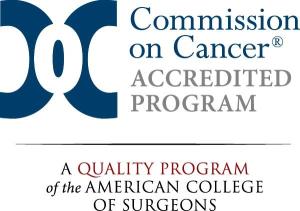Thyroid Cancer
Although thyroid disorders are common, thyroid cancer is rare. That’s why, when it happens, you need expert care. You can count on our cancer specialists to treat your thyroid cancer with the comprehensive tools and techniques you need to fight it effectively. As an accredited Comprehensive Community Cancer Program, we offer nearly all the same options and technology you’d find at an academic medical center, just close to home.

Our multidisciplinary care team takes a patient-first approach to treatment planning—caring not just for your physical health, but your mental and emotional health, too. And that means we’ll be by your side for every step of treatment with all the compassion and understanding you need to feel supported and confident in your care.
What is Thyroid Cancer?
Thyroid cancer develops in the cells of the thyroid—the butterfly-shaped gland in the front of the neck that makes hormones and helps regulate the body’s metabolism, heart rate and blood pressure. Many growths can develop in the thyroid gland, but fortunately, most are benign (noncancerous).
Thyroid Cancer Symptoms
Thyroid cancer can cause:
- A lump in the neck
- Hoarseness or other voice changes that don’t go away
- Pain in the neck that radiates up to the ears
- Swelling in the neck
- Trouble swallowing or breathing
Thyroid Cancer Risk Factors
A risk factor is something that increases your risk for developing a certain type of cancer. Some, like those related to genetics, you can’t change. But others, like risk factors related to lifestyle, you can.
Common risk factors for thyroid cancer include:
- A diet that includes too much iodine
- Age (most women diagnosed in 40s or 50s; most men in their 60s or 70s)
- Certain hereditary conditions, such as Cowden disease or familial adenomatous polyposis (FAP)
- Exposure to radiation
- Family history of the disease
- Gender (affects women three times more often than men)
- Obesity
Thyroid Cancer Types
There are several types of thyroid cancer, including:
- Differentiated thyroid cancer includes papillary cancers, which account for most thyroid cancers. Differentiated cancer cells look very similar to normal thyroid tissue cells under a microscope. Papillary cancers—which begin in the thyroid’s follicular cells where your body produces the hormones that regulate the body’s metabolism—tend to grow slowly and develop in only one lobe of the thyroid.
- Medullary cancers develop from the C cells of the thyroid gland, which make calcitonin, a hormone that controls the amount of calcium in the blood.
- Undifferentiated carcinoma (or anaplastic carcinoma) is a type of thyroid cancer that’s rare—and since it often spreads to the neck and other parts of the body quickly, it can be hard to treat. In undifferentiated cancers, the cancer cells don’t look like normal cells.
Diagnosing Thyroid Cancer
Thyroid cancer is often diagnosed when a patient finds a lump in the front of their neck. But it can also be diagnosed during a routine test or exam. A doctor may notice a mass in the neck, for example, during a physical exam, or see an area of abnormal-looking tissue on the thyroid during an X-ray.
If we suspect thyroid cancer, we may recommend certain diagnostic tests to either confirm the presence of disease or rule it out, including:
- Biopsy, which involves taking a small sample of tissue from the gland to test for disease.
- Blood tests to see if your thyroid is working normally. If your blood levels of thyroid-stimulating hormone, or TSH, are high, for instance, it could be because the thyroid isn’t working properly.
- Imaging tests to look for thyroid cancer, such as CT scan, MRI, PET scan, X-ray and ultrasound.
Because thyroid cancer can sometimes affect the vocal cords, we also may examine your larynx (voice box) during a procedure called a laryngoscopy, which uses a special tool to help a doctor see down the throat.
Treating Thyroid Cancer
Your cancer care team—which will include medical, surgical and radiation oncologists, endocrinologists and supportive care clinicians, such as dietitians, counselors and nurse practitioners—will work together, and with you, to develop a treatment plan that’s personalized to your specific diagnosis and treatment goals.
In general, treatment for thyroid cancer may include:
- Chemotherapy may be used, often in combination with radiation therapy, to treat certain cancers that are no longer responding to other treatments.
- Hormone therapy may be used to block the release of hormones that can cause the cancer to spread or come back.
- Radiation therapy may be a good option for patients whose thyroid doesn’t absorb iodine or for patients whose cancer has spread beyond the thyroid.
- Radioactive iodine therapy may be used to treat cancer in the gland. Radioactive iodine collects mainly in thyroid cells, where the radiation can destroy the cancer and healthy cells with little effect on the rest of the body. We may use this to treat cancer cells that weren’t removed with surgery or to treat certain thyroid cancers that have spread to other parts of the body.
- Surgery: This is often the main treatment for most thyroid cancers. Often, it can be used to completely remove the cancer.





































